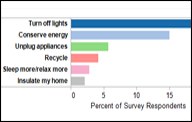
Americans are taking steps to conserve energy, though not necessarily the most effective ones, according to a new report by researchers from Columbia, Ohio State and Carnegie Mellon universities.
The study, published in the Proceedings of the National Academy of Sciences, found most respondents believed the best way they could save energy was through curtailing behaviors (driving less, for example) instead of efficiency improvements (say, buying a fuel-efficient car). Efficiency steps save significantly more energy, researchers said, though they may cost more up front.
As part of the survey, the 505 participants were asked an open-ended question on what they could do to save energy. Turning off lights (another example of curtailment), and "conserve energy" (not categorized by the researchers) were the two most popular responses given, while home insulation and using energy efficient light bulbs, two actions that experts say would save significantly more energy, were some of the least popular.
Also perhaps noteworthy: a greater percentage of respondents answered "sleep more/relax more" than "insulate my home."
Use the graph below to compare public perceptions of energy savings.
Many of those who took part in the survey also seemed unaware of large-scale economic energy differences. Examples include whether using a train or a truck uses less energy -- trucks actually consume 10 times more energy per ton-mile, according to the study -- or whether using glass or aluminum beverage containers was a better energy saver. Most incorrectly assumed glass takes less energy to make, but a glass bottle requires 1.4 times as much energy as an aluminum can, and 20 times as much energy when using recycled materials, says the report.
As for reasons why Americans exhibit "serious deficiencies" when it comes to understanding or practicing energy savings, researchers speculated, "efficiency improvements almost always involve research, effort, and out-of-pocket costs (e.g., buying a new energy-efficient appliance), whereas curtailment may be easier to imagine and incorporate into one's daily behaviors without any upfront costs."
The participants were required to give some specific demographic information, providing some interesting insights into who knows their energy savings ABCs. Those with "pro-environmental attitudes" appeared to have more knowledge of energy conservation, as did those with a firmer grasp of numerical concepts. The researchers speculated that this could mean more education on energy conservation could help people understand and incorporate energy saving methods into their lives.
In a surprise to researchers, when studying demographics, participants who reported more "energy-saving behaviors" did not have as good an understanding of energy conservation. The study's authors suggested this might be because some people have an "unrealistic optimism" about their energy savings methods or because people tend to focus on what they are already doing instead of strategies they aren't currently using.
The study did have limits, researchers admitted. The participants -- recruited through Craigslist -- were diverse, but not scientifically representative of the U.S. adult population. The study's authors also said they were not sure how the survey participants actually used energy day to day. Lastly, researchers said respondents were not offered any incentive for accuracy.
(Public Perceptions of Energy Consumption and Savings PDF)
Suzette Lohmeyer is a staff writer and producer for State of the USA.
Data visualization by Anthony Calabrese, a State of the USA Web producer.
 Print This
Print This RSS Feed
RSS Feed